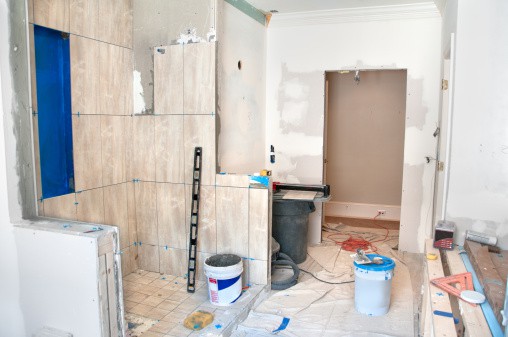Research shows that the average homeowner has nine home improvement projects that need attention. Yet, 32% of homeowners have been putting off those projects for at least a year or more.
Does this sound like you? In today’s era of Pinterest and HGTV, it’s all too easy to dream up new ideas and plan remodeling efforts. Yet, putting in the elbow grease required to turn them into a reality? That’s an entirely different story.
This is why it pays to have a great home improvement contractor on speed dial.
Whether you’re interested in merely beautifying your patio or you need a complete bathroom overhaul, you need the experts on your side. However, not all contracting teams are created equal. We’re sharing a few tips on how to choose one that’s an excellent fit for your home and family.
Why Hire a Home Improvement Contractor?
You’ve watched a few episodes of “Fixer Upper,” so you should be able to handle demolition, right? Not so fast. While most of us love to fancy ourselves as handier than we are, most home projects require expertise beyond our skill sets.
While you might be able to paint a bedroom or even lay a kitchen backsplash on your own, there are myriad updates that only a qualified professional should handle.
Take installing a new floor, for instance. What are the next steps if you pulled up the tile in your bathroom only to find that the subfloor below was rotted? Suddenly, a seemingly simple job became the exact opposite. The same goes for doing your plumbing, electrical installations, or roofing repairs.
These are only a few of the projects that the average homeowner should never attempt on his own. Yet, before you start asking around to find contractors, let’s review a few steps that can save you time and money.
Understand Your Needs
You can’t find the right contractor if you’re totally in the dark about what you want your project to be. That’s why your very first step should be to narrow down precisely what you want the finished project to entail.
For instance, if you want to spruce up your kitchen, does this just mean installing new countertops? Are you replacing all of the cabinetry, installing new floors, and painting the room, too? As you can imagine, your budget for the latter will be higher than the former.
When you know the full breadth of your project, you can make sure that the estimates you receive are accurate. If you skip this step and dive straight into talking to contractors, their visions could vary, and as such, so will your bottom line.
Ask Around for References
Studies reveal that 84% of people trust online reviews as much as personal recommendations from friends and family members. While you should certainly ask your acquaintances if they have anyone they’d recommend, don’t stop there.
Today, there is information on home services available on the internet. With just a few clicks, you can connect with local, pre-screened professionals who can get the job done. You can also read reviews and learn firsthand how previous clients’ experiences went.
If you find a team that fits the bill, you can even reach out to them directly! A few of the top platforms to check out include:
In addition to these resources, you can also ask your local hardware stores if they know any local builders they would recommend. Often, these staff members assist members of the trade daily and will have plenty of contacts to share. Especially as you read online reviews, remember to take them with a grain of salt.
While a string of negative reviews should be a visible sign, don’t let one negative comment completely steer you away from a team that otherwise checks all of your boxes. If all of the rest of the reviews are generally positive, keep them on your list and make a note to ask about the negative feedback once you hold your interview.
Check Online Presence
In today’s Digital Age, almost every business should have some sort of web presence.
Also, it should provide you with plenty of information to help you make an informed decision. First, look for the list of services that each contractor offers to make sure yours is covered. For instance, some teams might only specialize in kitchens, putting them out of the running for your master bedroom remodel.
Once you’ve determined that your project is within their scope, look for client testimonials and photo galleries of their past work. That is a great way to see for yourself the quality of work that they provide. Does it fit your style and personal aesthetic?
Finally, each website should have a “Contact” page that makes it easy to get in touch with the team. If the contractor you’re considering doesn’t have a full-fledged website, look for their digital business profile in an online directory such as Google My Business. Here, you can find the necessary information about every registered company, including:
- Contact information
- Website
- Client ratings
- Client feedback
- Hours and location
If the contractor you’re considering doesn’t have any online footprint, inquire about this during your initial interview.
Review Litigation History
Due to the nature of the industry, it isn’t uncommon for home contractors to become entangled in ongoing litigation issues with dissatisfied homeowners.
While this might not necessarily be a rarity, it’s something you don’t want to become trapped in yourself. Before signing any contract, be sure to run the business name by your State Bar disciplinary board. This way, you can know if there are any past or outstanding grievances against them that you should know.
You can find similar information by checking the contractor’s rating on the Better Business Bureau (BBB). If there have been any legal battles, you might also locate important details in local court records.
Hold Interviews
It’s no secret that a home remodel can be a costly investment. As such, it’s essential to do your due diligence before partnering with a home improvement contractor.
Wait until you have at least five options, and then start holding interviews. You can choose to perform these over the phone or invite the contractors to your home. During this time, ask essential questions, including:
- How long have you been in business?
- What is your business license number?
- Can you provide me with a copy of your insurance policy?
- How much work will be performed by subcontractors?
- Have you completed a home project like this one before?
- Can you provide me with a list of references I can contact?
- When can you begin?
Questions about business insurance and licenses are critical. Never partner with a contractor who does not hold both of these two items. They are necessary to protect both your family and their team from potential liabilities.
If you experience any sort of pushback on these questions, consider this a red flag and take your search elsewhere. A reputable and reliable contractor will be transparent, honest, and available to ease your mind and answer any inquiry you might have. They’ll also be willing to share copies of any critical documents, such as insurance, that you need.
Remember: You will be working with this person or team directly, and you’re welcoming them into your home. You should feel comfortable and respected at every turn.
Request Written Estimates
Be wary of any contractor who offers to give you a verb estimate up-front. You need a written, detailed estimate to conduct a proper comparison.
Once you receive written estimates from your top five options, make sure they line up. They should all include the same types of materials and tasks. Otherwise, you’ll be comparing apples to oranges.
As you’re reviewing, you might find it helpful to reach out to individual material suppliers to verify the materials. Though you expect contractors to mark up these materials, you shouldn’t have to pay leaps and bounds above the list cost. A simple phone call can help you discern which contractors are marking their contents at a much higher rate than others.
While it’s tempting always to take a closer look at any quote that’s significantly cheaper than the others, this could mean they left something off or underpriced an item just to win your business. You want to avoid paying a surprise charge out of pocket down the road.
Consider Pace of Correspondence
As you’re interviewing and holding these initial dialogues with your prospective contractors, take note of how long it takes them to get back to you. Did you request an estimate on Monday, but didn’t get it until two weeks later? While you don’t want someone to rush their bid, you also don’t want them to drag their feet.
The same goes for phone and email correspondence. If you’ve reached out to a contractor on multiple occasions only to wait days for a response, think about how this lack of communication will play out during the remodel.
While you can’t expect them to keep their phone on 24/7 or be available after hours or on weekends, they should have the courtesy and professionalism to respond to your questions as soon as they’re able to, without making you wait an excessive amount of time.
Check References
When you ask for references from a contractor, be sure to use that list to your advantage. Don’t just request the numbers and then keep the paper in a drawer. Call them and ask the questions you want to be answered!
A few of the most important ones to ask include:
- How close were the contractor’s initial estimate and final price?
- Did you get along well with the project manager?
- Can I see close-up examples of the contractor’s work?
- Would you hire this team again? Why or why not?
This is a valuable time for you to learn what past clients liked about the work, and what they would change. If you can get ahold of them, it’s also helpful to speak with the subcontractors who will be assigned to your job. Do they get paid on time and treated well?
If they shake their head “no,” consider if this is a person you want to trust your time, money, and home.
Create and Sign a Contract
Once you find a contractor that is a perfect fit for your project, it’s time to make things official! Before beginning any work, you should work together to create a contract that you both agree to.
As with all critical business correspondence, this should be done entirely in writing, so everyone has a record of the agreement. Make sure the final project leaves no question concerning the nature of the work. At the very least, the contract should include the following details:
- Exactly which tasks the contractor’s team will perform
- The specific deadlines for deliverables
- The payment schedule
- The exact materials to be used (including model number)
- Who will provide the materials
If the project changes scope at all while the work is being performed, your contractor should create a written change order that details the changes in full, including new materials and costs incurred.
Start Your Home Improvement Project Today
What are you waiting for? It’s time to stop putting those home improvement projects on the back burner and start tackling them today! If it’s a minor upgrade, you feel comfortable performing yourself, go ahead and get started.
Otherwise, follow these steps above to hire an excellent contractor who can get the job done right the first time. This way, you can start enjoying your new and improved space as soon as possible!
Once you’re settled in and enjoying your fresh digs, don’t forget to keep them protected. Our article on home security systems explains how to choose a setup that makes you feel safe!



